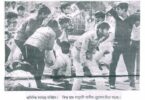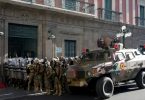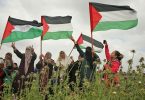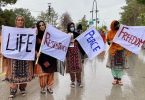By Lal Khan
The history of imperialism is littered with aggression, occupation and tyranny upon the vanquished peoples of the oppressed countries of different regions conquered in various epochs of imperialist crusades. One of the US imperialism’s most nefarious acts of aggression took place on the tragic autumn forty-nine years ago. One of the world’s most renowned revolutionary fighters against capitalist oppression and imperialist hegemony, Che Guevara was brutally murdered under the supervision of US military experts in the rugged mountain terrain about forty miles south west of La Paz the capital of Bolivia on October 9th, 1967.
A US declassified memorandum dated October 11, 1967 to United States President Lyndon B. Johnson from his National Security Advisor Walt Whitman Rostov, called the decision to kill Guevara, “stupid” but “understandable from a Bolivian standpoint”. Félix Rodríguez, a CIA Special Activities Division officer, advised and led the Bolivian troops in person to the hunt and macabrely killed Guevara. The Nazi war criminal Klaus Barbie also helped the CIA to orchestrate Che’s eventual capture. After the murder, Rodríguez stole Che’s Rolex GMT Master wristwatch that he flaunted to reporters in the following years.
 But Che Guevara’s assassination failed to kill the ideas of revolution and liberation that his personality beamed in his life and death. After half a century of his brutal killing, Che Guevara is the symbol of resistance against tyranny and enslavement and a source of inspiration particularly for the youth to this day. Perhaps more now in this temporary period of a superficial inertia of the mass movements, than it was in his lifetime. Even the Time magazine named him one of the 100 most influential people of the 20th century, while his picture taken by Alberto Korda, titled “Guerrillero Heroico”, was cited by one of the most prestigious centres of learning in the US, the Maryland Institute College of Art as “the most famous photograph in the world”.
But Che Guevara’s assassination failed to kill the ideas of revolution and liberation that his personality beamed in his life and death. After half a century of his brutal killing, Che Guevara is the symbol of resistance against tyranny and enslavement and a source of inspiration particularly for the youth to this day. Perhaps more now in this temporary period of a superficial inertia of the mass movements, than it was in his lifetime. Even the Time magazine named him one of the 100 most influential people of the 20th century, while his picture taken by Alberto Korda, titled “Guerrillero Heroico”, was cited by one of the most prestigious centres of learning in the US, the Maryland Institute College of Art as “the most famous photograph in the world”.
Che was a Marxist revolutionary who was a physician by profession originally. During his struggle he also became an author, a diplomat, and military tactician in guerrilla warfare. Che along with Fidel Castro was the main leader of the Cuban Revolution.
As a young medical student, Guevara travelled on a motorcycle throughout South America and was moved by the harrowing poverty, hunger, and disease he witnessed in the heartlands of the continent. The experiences of imperialist and bourgeois oppression instilled a burning desire to overthrow capitalist coercion and exploitation of Latin America by the United States. Later, in Mexico City, Che met Raúl and Fidel Castro, joined their 26th of July Movement and the struggle they were in the process of launching in Cuba to overthrow and demolish the U.S-backed dictatorship of Fulgencio Batista. He soon became famous and developed trust and respect for his intellect and courage among the revolutionists. Soon he became the second-in-command of the revolutionary force and played a crucial role in the victorious two-year guerrilla struggle that deposed the Batista regime. However, he was aware that the general strike of the industrial workers in Havana and other towns of Cuba, where the imperialist-owned industry was mainly based, played a pivotal role in making the victory a reality.
After the Cuban Revolution, Guevara performed various duties in the new state and regime that came into being after the revolution. These included work of the revolutionary tribunals, carrying out agrarian land reforms, organised the hugely successful literacy campaign and instructional director for new Cuba’s newly set up structures of armed forces. He visited several countries across the world as a diplomat and representative of Cuban socialism. But Che had sterling qualities, as he was a prolific writer and poet he also wrote a manual on guerrilla warfare, along with a best-selling memoir about his youthful continental motorcycle journey. Che continued to study and develop his understanding of Marxism in greater depth.
Through Marxism and the experiences of his life, he came to the conclusion that the only solution for the liberation of the oppressed classes and subjugated peoples lay in the class struggle on the basis of proletarian internationalism and success of the world revolution. In 1965 on the sixth anniversary of the victory of the Cuban revolution Che left Cuba to participate practically in the revolutionary movements surging in various parts of the world. He started his journey to Congo-Kinshasa where there was an uprising against the rotten capitalist and imperialist puppet regime and later in Bolivia, where he launched an armed struggle on the lines of the Cuban revolution. But tragically Che was captured by CIA-assisted Bolivian forces and summarily executed. Ever since he has remained a revered and inspirational revolutionary figure and has been the subject of numerous biographies, memoirs, poems, documentaries, songs, and films. His tireless invocations for a revolutionary class struggle have made Che into a quintessential hero and icon of various leftist-inspired youth movements.
Che’s writings are a witness to his Marxist ideological understanding commitment, “The merit of Marx is that he suddenly produces a qualitative change in the history of social thought. He interprets history, understands its dynamic, predicts the future, but in addition to predicting it (which would satisfy his scientific obligation), he expresses a revolutionary concept: the world must not only be interpreted, it must be transformed. Man ceases to be the slave and tool of his environment and converts himself into the architect of his own destiny.” (Notes for the Study of the Ideology of the Cuban, published in Verde Olivo, October 8, 1960)
Marxism was also his main source of motivation and inspiration, “There are truths so evident, so much a part of people’s knowledge, that it is now useless to discuss them. One ought to be a Marxist with the same naturalness with which one is ‘Newtonian’ in physics, or ‘Pasteurian’ in biology…The laws of Marxism are present in the events of the Cuban Revolution, independently of what its leaders profess or fully know of those laws from a theoretical point of view.” (The “New Man”, Bay of Pigs, and missile crisis)
In Guevara’s, Man and Socialism in Cuba, he wrote, “Man truly achieves his full human condition when he produces without being compelled by the physical necessity of selling himself as a commodity.”
When Che took charge of his responsibilities all educational, mass media, and artistic community-based facilities these were nationalized and mobilised to inspire the socialist ideology. In describing this new method of “development”, Guevara stated: “There is a great difference between free-enterprise development and revolutionary development. In one of them, wealth is concentrated in the hands of a fortunate few, the friends of the government, the best wheeler-dealers. In the other, wealth is the people’s patrimony…This is not a matter of how many pounds of meat one might be able to eat, or how many times a year someone can go to the beach, or how many ornaments from abroad one might be able to buy with his current salary. What really matters is that the individual feels more complete, with much more internal richness and much more responsibility.”
 On December 11, 1964, as head of the Cuban delegation to the UN General Assembly session Guevara spoke passionately for more than an hour. He criticized the United Nations’ inability to confront the issues faced by the world. “The brutal policy of apartheid in South Africa, can the United Nations does nothing to stop this…” In his concluding remarks Che said, “This epic would be written by the hungry masses, peasants without land, exploited workers, and progressive masses mistreated and scorned by imperialism. Those who were previously considered as weak and submissive ‘flock’…Yankee monopoly capitalism is now terrifyingly seeing them as their gravediggers. It would be during this hour of vindication that this anonymous mass would begin to write its own history, with its own blood, and reclaim those rights that were laughed at by one and all for 500 years… this wave of anger would sweep the lands of Latin America and that the labour masses who turn the wheel of history were now, for the first time, awakening from the long, brutalizing sleep to which they had been subjected.”
On December 11, 1964, as head of the Cuban delegation to the UN General Assembly session Guevara spoke passionately for more than an hour. He criticized the United Nations’ inability to confront the issues faced by the world. “The brutal policy of apartheid in South Africa, can the United Nations does nothing to stop this…” In his concluding remarks Che said, “This epic would be written by the hungry masses, peasants without land, exploited workers, and progressive masses mistreated and scorned by imperialism. Those who were previously considered as weak and submissive ‘flock’…Yankee monopoly capitalism is now terrifyingly seeing them as their gravediggers. It would be during this hour of vindication that this anonymous mass would begin to write its own history, with its own blood, and reclaim those rights that were laughed at by one and all for 500 years… this wave of anger would sweep the lands of Latin America and that the labour masses who turn the wheel of history were now, for the first time, awakening from the long, brutalizing sleep to which they had been subjected.”
On December 17, Guevara left New York for a whirlwind international visit to France, People’s Republic of China, North Korea, the United Arab Republic, Algeria, Ghana, Guinea, Mali, Dahomey, Congo-Brazzaville and Tanzania, with stops in Ireland and Prague. During this foreign visit, he wrote a letter to Carlos Quijano, editor of a Uruguayan weekly, in which he said, “The laws of capitalism, blind and invisible to the majority, act upon the individual without his thinking about it. He sees only the vastness of a seemingly infinite horizon before him. That is how capitalist propagandists, who purport to draw a lesson from the example of Rockefeller about the possibilities of success, paint it. The amount of poverty and suffering required for the emergence of a Rockefeller, and the amount of depravity that the accumulation of a fortune of such magnitude entails, are left out of the picture, and it is not always possible to make the people, in general, see this… the true revolutionary is guided by a great feeling of love and strive every day so that this love of living humanity will be transformed into acts that serve as examples, thus becoming a moving force”.
Helen Gaffe, the author of Che Guevara: The Economics of Revolution wrote, “In Guevara’s private writings from this time, he displays his growing criticism of the Soviet political economy, believing that the Soviets had ‘forgotten Marx’. This led Guevara to denounce a range of Soviet practices including what he saw as their attempt to air-brush the inherent violence of class struggle integral to the transition from capitalism to socialism, their dangerous policy of peaceful co-existence with the United States, their failure to push for a change in consciousness towards the idea of work, and their attempt to liberalize the socialist economy. Guevara wanted the complete elimination of money, interest, commodity production, the market economy, and mercantile relationships. All conditions that the Soviets argued would only disappear when world communism was achieved. Disagreeing with this incrementalist approach, Guevara criticized the Soviet Manual of Political Economy, correctly predicting that if USSR would not abolish the law of value (as Guevara desired), it would eventually return to capitalism.”
As Guevara prepared for Bolivia, he wrote a letter to his wife and to his five children to be read upon his death, which ended with him instructing them: “Above all, always be capable of feeling deeply any injustice committed against anyone, anywhere in the world. This is the most beautiful quality in a revolutionary.”
Where Che was revered and loved by the youth and the oppressed around the world he was also hated and feared by the imperialist bosses and belligerent capitalist states and their strategists. In fact, he had become the most potent, inspiring and iconic figure for a socialist revolution in the generation of those days. The imperialists and capitalist bosses were desperate to eliminate Che Guevara. Philip Agee, a CIA agent from 1957-1968, wrote in his memoirs, “There was no person more feared by the company (CIA) than Che Guevara because he had the capacity and charisma necessary to direct the struggle against the political repression of the traditional hierarchies in power in the countries of Latin America.”
In July 2008, the Bolivian government of President Evo Morales unveiled Guevara’s ‘sealed’ diaries composed in two frayed notebooks, along with a logbook and several black-and-white photographs. At this event, Bolivia’s vice-minister of culture, Pablo Groux, expressed that there were plans to publish photographs of every handwritten page later in the year. It was in this land of Bolivia that Che Guevara, who was mutilated and killed after a brutal torture by the CIA, received all honours by a government proclaiming to be socialist. The Bolivian flag was flown at half-mast and the parliament observed a silence to pay him respects on the anniversary of his assassination.
However Che’s legacy not only lives on but also is more revered today. He is still an icon of hope and a revolutionary transformation of society, particularly for the youth that are struggling to change their lives and overthrow the yoke of this coercive and inhuman capitalist system that is plunging mankind into a barbaric future staking the survival of human civilisation.
Months earlier, during his last public declaration to the Tricontinental Conference, Guevara wrote his own epitaph, stating “Wherever death may surprise us, let it be welcome, provided that this, our battle cry, may have reached some receptive ear and another hand may be extended to wield our weapons.”






